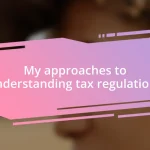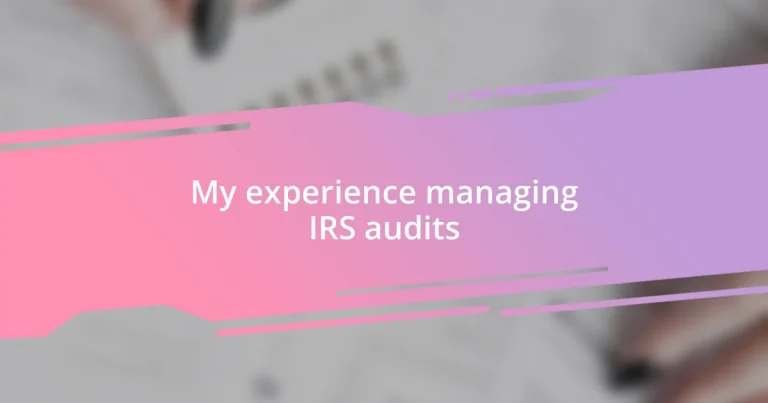Key takeaways:
- Understanding the IRS audit process is crucial; audits begin due to discrepancies in tax returns, not random selection.
- Preparation is key; gathering necessary documentation like tax returns, income records, and receipts can ease anxiety and present a strong case.
- Effective communication with IRS representatives and maintaining transparency in tax filings can transform stressful situations into collaborative resolutions.
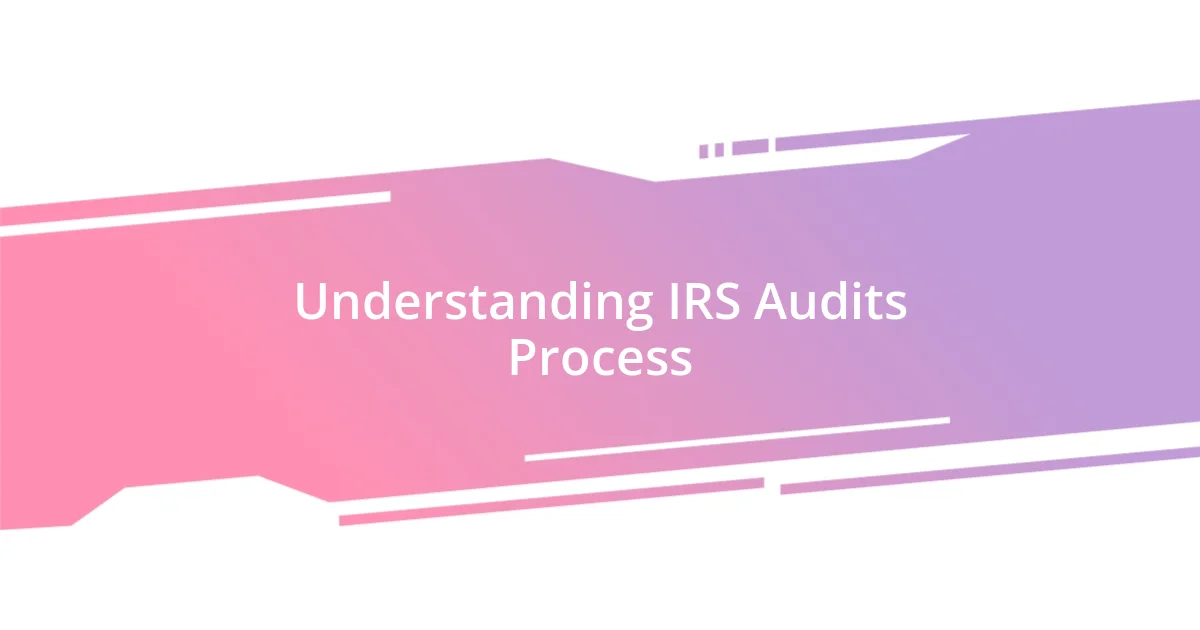
Understanding IRS Audits Process
When I first encountered the IRS audit process, I was overwhelmed. The reality is that an audit begins when the IRS identifies discrepancies or unusual patterns in your tax return. It’s not merely a random selection; it can stem from something as simple as a math error or that tempting, but sometimes suspicious, home office deduction. Have you ever wondered what triggers the IRS to take a closer look at your return?
As the process unfolded for me, I realized that it typically involves a thorough examination of the financial information you presented. The IRS may request documentation—everything from income statements to receipts supporting deductions. I remember gathering boxes of paperwork, feeling a mix of anxiety and determination. It made me think; how often do we take our tax paperwork for granted, not knowing it could lead to an unexpected scrutiny?
One critical aspect of the audit is understanding the different types: correspondence audits, office audits, and field audits. Each type varies in scope and seriousness. I’ve seen how a correspondence audit, which is conducted through mail, can be less stressful than a field audit, where an auditor shows up at your home or office. I often ponder how it’s essential to remain calm and organized through each type of audit, as being proactive can make the entire experience less daunting.
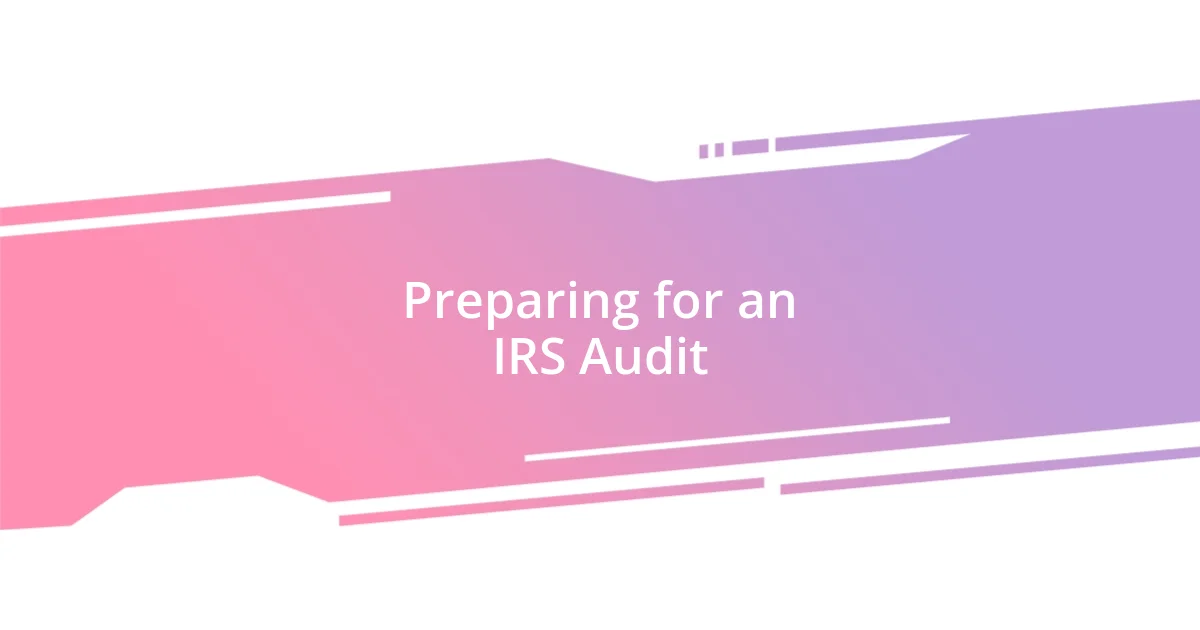
Preparing for an IRS Audit
Preparing for an IRS audit can feel daunting, but I’ve learned that a solid approach can make all the difference. I remember the weeks leading up to my first audit, feeling like I was on a tightrope. I quickly realized the importance of gathering all relevant documents ahead of time. This preparation helped me feel more in control and less anxious about the impending review.
Here’s a checklist of key items to gather as you prepare:
- Tax Returns: Have copies of previous years readily accessible.
- Income Records: Any W-2s, 1099s, or other income documentation.
- Receipts and Documentation: Keep all receipts related to deductions; it really helps to have these organized.
- Bank Statements: Compile statements that support your reported income and expenses.
- Correspondence from the IRS: Any letters or notices you’ve received should be handy for reference.
Taking the time to systematically gather these documents not only bolstered my confidence but also put me in a strong position to address any questions. Reflecting on that experience, I realized that taking a proactive stance can transform a nerve-wracking situation into a manageable one.
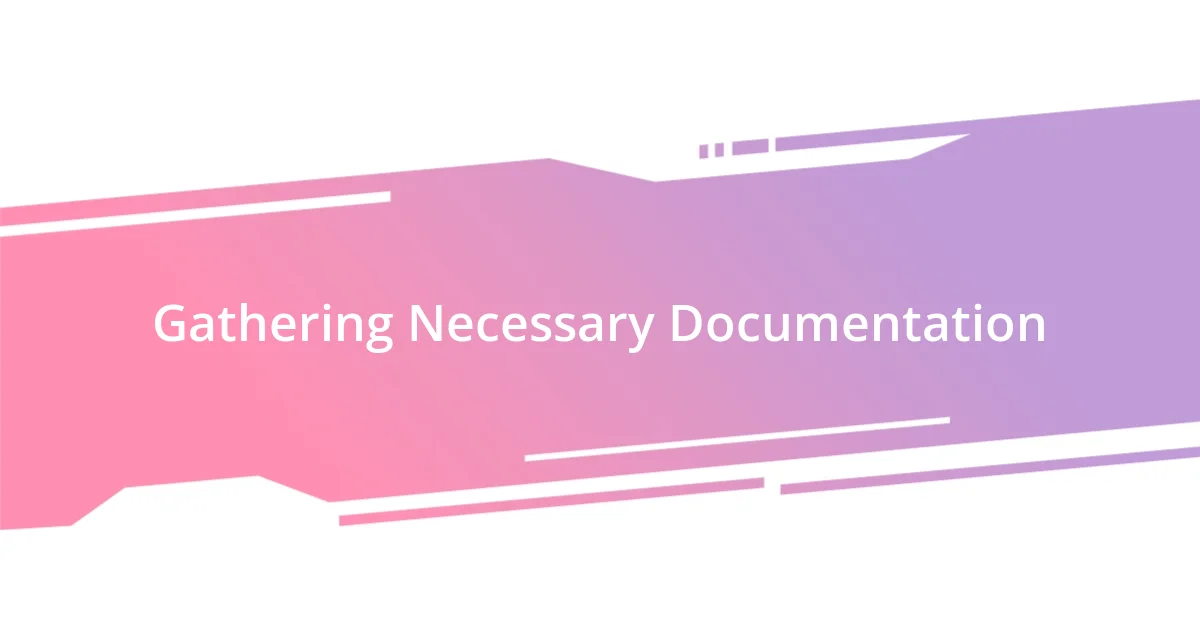
Gathering Necessary Documentation
Gathering the necessary documentation for an IRS audit is a task that demands attention and organization. I recall feeling like I was piecing together a puzzle, each document integral to forming a complete picture. The first step was to methodically compile my tax returns and any supporting income records, such as W-2s and 1099s. Having a dedicated folder for these documents made it feel manageable, turning the process from daunting to systematic.
It’s essential to remember that the IRS looks closely at your deductions, so I kept an organized collection of receipts and invoices related to those expense claims. I even employed color-coded tabs for different categories, which helped limit the confusion during this stressful time. This little strategy not only saved me hours but also helped alleviate some of the anxiety I felt while preparing. Have you ever found that a little organization can go a long way in easing stress?
What I found particularly helpful was creating a timeline to track my correspondence with the IRS. I listed out every document requested and the dates I sent them. It brought a sense of clarity amid what felt like a whirlwind of information. In hindsight, I realized this approach turned what could have been an overwhelming task into a structured plan. By treating the gathering of documentation as a project, I empowered myself to navigate the audit with confidence.
| Type of Documentation | Importance |
|---|---|
| Tax Returns | Foundation for audit review |
| Income Records | Verify reported income |
| Receipts for Deductions | Support claims made |
| Bank Statements | Validate income and expenses |
| IRS Correspondence | Reference letters for specific issues |
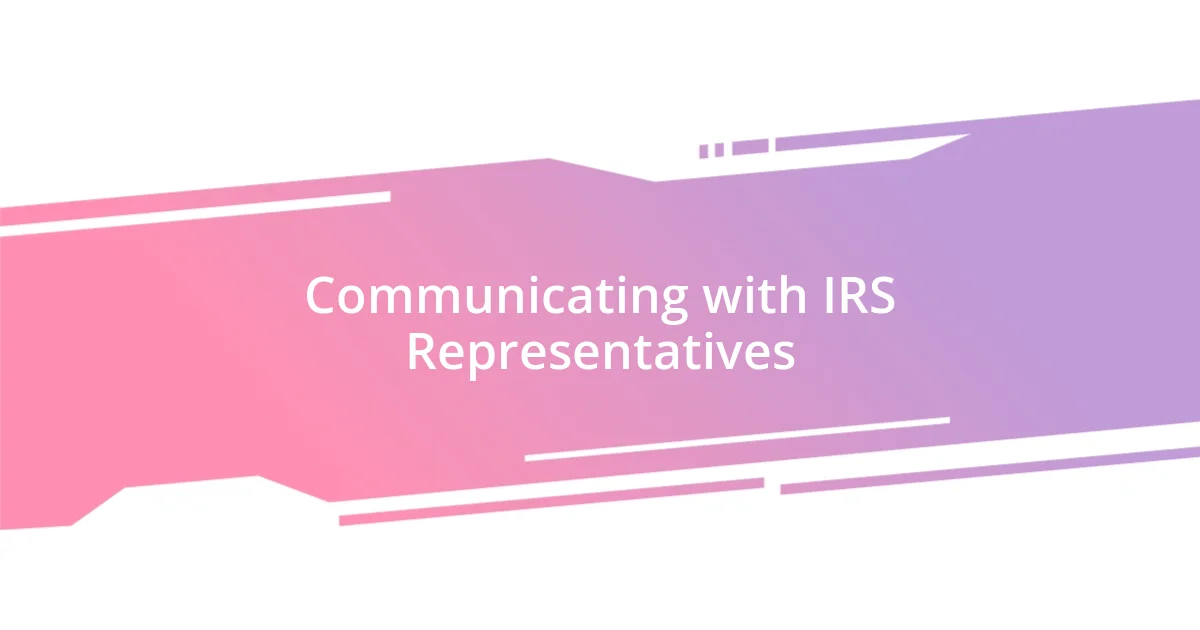
Communicating with IRS Representatives
I quickly discovered that communicating with IRS representatives required a blend of professionalism and a personal touch. When I first reached out, I felt an overwhelming sense of anxiety. However, I learned that being polite and prepared opened doors for better dialogue. I remember approaching the conversation with a genuine curiosity—asking clarifying questions helped me understand their perspective better, making the interaction feel more like a collaboration than a confrontation.
One thing I noticed during these discussions was the importance of active listening. It’s easy to get caught up in what you want to say, but I found that truly hearing the representative’s concerns allowed me to address them more effectively. There were moments when they would share information that led me to rethink my approach. Have you ever felt a shift in your perspective just by listening more closely? I certainly did, and it was enlightening.
In instances where I didn’t agree with their assessments, I learned to remain calm and collected. It’s vital to approach disagreements with respect; you want to maintain a constructive dialogue rather than escalate the situation. I recall one particular conversation where patience turned an initially tense exchange into a productive resolution. By the end, we reached an understanding, and I felt more empowered and informed than I had before. Communicating with IRS representatives is not just about addressing issues; it’s about building a rapport that can ultimately benefit both parties.
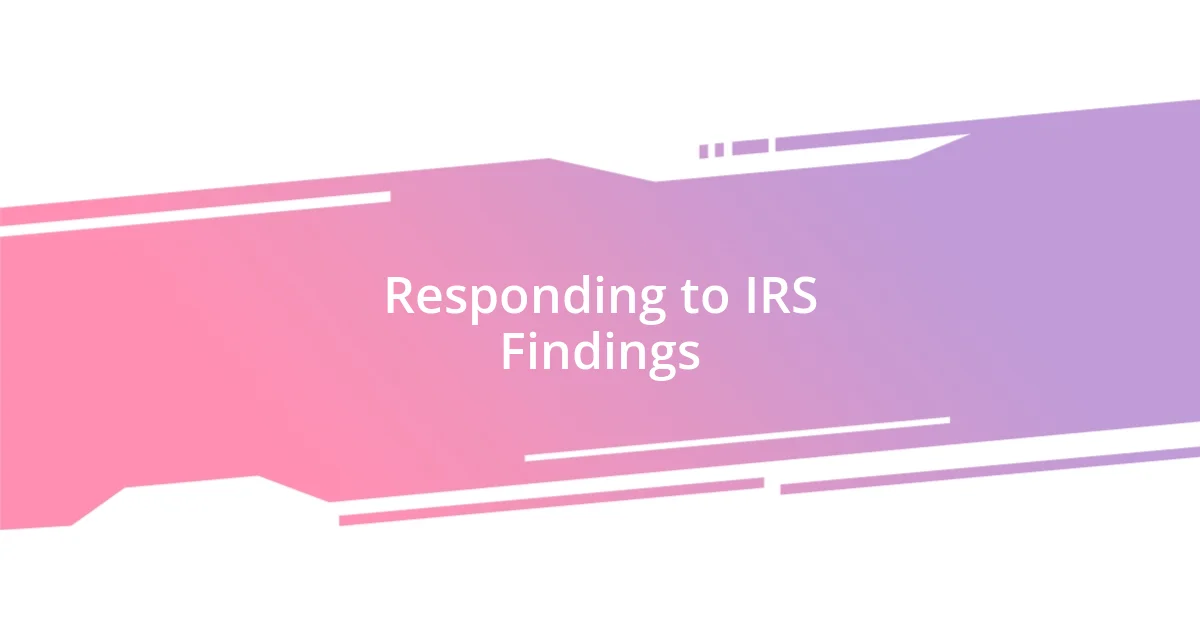
Responding to IRS Findings
Responding to IRS findings can feel like a mountain to climb. After receiving their initial notice, I remember staring at the letter in disbelief. It felt like being called to the principal’s office; the dread was palpable. My immediate reaction was to gather every document tied to the findings and form a solid response. This wasn’t just about defending my position but showing that I took the audit seriously. Have you ever felt that rush of determination to set things right?
When crafting my response, clarity was crucial. I made sure to outline my points clearly, referencing specific documents to support my case. I even used simple bullet points to make my arguments visually accessible. Thinking back, I felt a sense of empowerment in taking control of the narrative. The IRS responds best to logic and reason; therefore, presenting a well-organized response is key. I discovered that detailing my explanations step-by-step helped demystify the issues and showcased my willingness to cooperate.
In my experience, following up promptly is just as important as the initial response. I inked in dates on my calendar, reminding myself to touch base periodically. The waiting game can drain your energy, but I found that proactive communication helped ease my anxiety. It’s fascinating how a simple update can transform the feeling of helplessness into a sense of partnership. How about you—have you noticed that staying engaged can make all the difference during uncertain times?

Navigating Appeal Options
Navigating Appeal Options
Once I realized I needed to appeal, the process felt a bit like reclaiming control over my situation. The first hurdle was understanding the different types of appeals available through the IRS. I remember sifting through IRS documentation and feeling overwhelmed by the terminology—terms like “Collection Due Process” and “Audit Reconsideration” felt daunting at first. But breaking down the options helped me identify what would best serve my circumstances. Have you ever felt lost in the details only to find clarity when you dive deeper? That’s exactly what happened to me.
As I started to navigate the appeal process, I discovered the power of documentation. I meticulously organized my evidence, ensuring it told a clear story aligned with the points of contention. One specific instance that stands out is when I came across a letter from my accountant that directly contradicted an IRS assertion. It felt like a moment of triumph! Presenting that piece of evidence not only strengthened my case but also boosted my confidence significantly. It’s remarkable how tangible proof can transform a seemingly dire situation into one of hope and opportunity for resolution.
Engaging with the IRS during the appeal can also feel like a dance—sometimes you lead, and other times, you follow. I learned to adapt my strategy based on the feedback I received. After submitting my appeal, I made it a point to request updates, keeping the lines of communication open. Have you ever taken an unexpected turn in negotiations? That’s how it felt; I realized that dialogue could lead to unexpected solutions. Being proactive turned my anxiety into a sense of partnership rather than a battle, which I found invaluable in navigating this complex process.
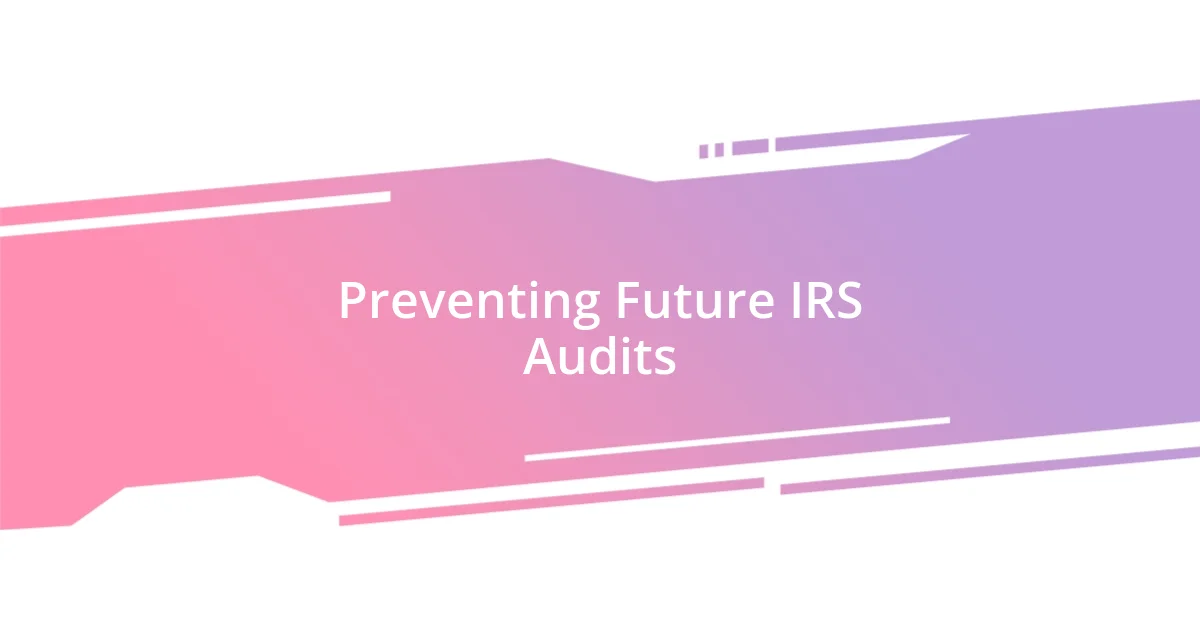
Preventing Future IRS Audits
After my audit experience, I prioritized financial organization to prevent future IRS audits. Maintaining meticulous records proved invaluable; I created detailed spreadsheets for income and expenses that I still use today. Have you ever found that simple organization saves you a headache later? I certainly did!
I also learned the importance of regular tax consultations. Meeting with my accountant quarterly helped me catch potential issues before they snowballed into something bigger. That proactive approach not only bolstered my confidence but also facilitated a deeper understanding of tax laws that are ever-evolving. It’s incredible how a little foresight and expert guidance can create a buffer against unwarranted audits.
Lastly, embracing transparency in my filing was a game changer. I started including thorough explanations in my tax returns for any deductions or credits that could raise eyebrows. It felt a bit like having dressed up my filing in a way that was hard to criticize! What I realized is that when you present a complete narrative, it discourages scrutiny, and that boosted my peace of mind.








